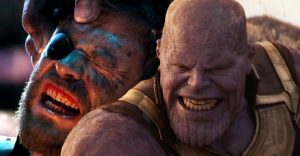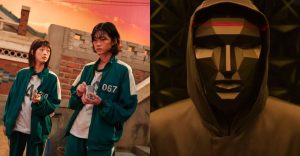8 Best Comic Books To Read If You Like Dune

Frank Herbert’s 1968 novel Dune is a landmark of soft science-fiction. The novel introduces a socially and politically complex universe and deals with deep and thought-provoking themes about the nature of heroism, faith, and destiny itself. Dune is one of the most influential pieces of fiction of the 20th century and an inspiration for countless writers.
Nowadays, the comic book industry is more influential than ever. Throughout the years, many comics have explored social, political, and religious themes under the guise of science-fiction. These compelling and ambitious works would make perfect companions for Herbert’s story, and the release of Denis Villeneuve’s Dune provides the ideal opportunity to revisit them.
8 Prism Stalker

Sloane Leong’s ongoing sci-fi adventure initially premiered in 2018 to a divisive response from audiences. The plot follows Vep, a refuge ripped from her home and taken to a newly discovered planet, full of “strange psychic life and puzzling telekinetic technology.” Prism Stalker‘s psychedelic art might not be for anyone, but its engaging plot is an ode to classic sci-fi that still manages to introduce revolutionary concepts to the venerable genre.
The setting of a new planet’s colonization recalls Dune‘s central themes of imperialistic control and resource exploitation. The planet’s strange and violent resources are also similar to Arrakis’ harsh conditions. The comic’s unique and vibrant artwork might differ from Dune‘s beautifully monochromatic shots, but Prism Stalker should scratch the sci-fic itch that Dune awakens.
7 Judge Dredd: The Day The Law Died

Judge Dredd is one of the most underrated comic book characters. Dredd acts as a law enforcement and judicial officer, a “street judge” in the dystopian Mega-City One. When the tyrannical Judge Cal assumes control of Mega-City One and begins ruling it like a futuristic version of Caligula, Dredd rallies other renegade Judges and Judge-Tutors and leads a resistance movement.
Wars against authority figures are a favorite trope of many sci-fi stories. Dune features a similar plot with Paul’s movement against the Empire with the Fremen’s help. Dredd’s notoriously chaotic atmosphere might clash with Dune‘s more minimalistic approach, but the two stories still share a thematic vein that would make them suitable companions.
6 Superman: Red Son

Red Son is one of Superman’s best storylines from the 2000s and arguably one of the best of his entire history. For years, Superman was synonymous with “the American way,” so placing him as the Soviet Union’s emblem was a stroke of genius.
Although the book presents the Man of Steel as “the champion of the common worker,” the story doesn’t delve directly into politics. Instead, it uses its premise to present a nature-vs-nurture argument, all while questioning Superman’s role as a hero. But, a hero to whom? Like Dune‘s exploration of the word’s very meaning, Red Son challenges the reader to see beyond the traditional interpretation of heroism and discover the inherent flaws of the concept.
5 Ex-Machina

Ex-Machina is one of the most ambitious sci-fi comics of the new millennium, a rich and relevant exploration of human values in the face of significant technological breakthroughs and considerable grief and distress. The story follows the life of Mitchell Hundred, AKA The Great Machine, “the world’s first and only superhero,” with the ability to communicate with mechanical devices. After he successfully stops one of the plains before it crashes with the WTC’s south tower during 9/11, Mitchell becomes Mayor of NYC.
Throughout its pages, Ex-Machina introduces several questions about the need for technology and the nature of heroism, the latter of which is a central theme in Dune. Like Paul Atreides, Mitchell Hundred acts as a messianic figure of sorts, born out of circumstance and humanity’s seemingly inherent need for a hero or savior. The idea is somewhat scary but compelling nonetheless.
4 Watchmen

Watchmen is one of the best and most profound graphic novels of all time. An ambitious, groundbreaking work that deconstructs the superhero genre. The plot follows masked superhero Roarshach as he investigates the murder of a fellow vigilante, The Comedian, only to stumble upon a massive conspiracy. Grim and tense, Watchmen uses its neo-noir setting to question the very nature of heroism.
Like Dune, Watchmen arrives at a noticeably bleak conclusion about humanity’s blind faith in heroic figures. Morality plays a crucial role in the stories of Paul Atreides and the Watchmen, as they struggle to live up to the role cast upon them by others. Like other of Alan Moore’s works, Watchmen openly critiques and challenges political institutions and the information they spread.
3 V For Vendetta

Another of Alan Moore’s most acclaimed and essential works is V for Vendetta, a call to arms against authoritarianism. Taking place in a dystopian version of the United Kingdom, V for Vendetta follows the intertwined stories of V, a masked anarchist with a plan to take down the ruling neo-fascist political party, and Evey Hammond, a young woman who becomes his protegé after stumbling upon his elaborate plan by chance.
The battle between fascism and anarchy is V for Vendetta‘s bread and butter, but the story also features lingering themes of fate, chance, and purpose. In Dune, these concepts also cast a looming shadow over the vast deserts of Arrakis, actively making the reader ask if Paul’s messianic role is “meant to be” or if he’s just a puppet in a larger battle for the Empire’s soul.
2 The Incal

Alejandro Jodorowsky’s unproduced adaptation of Dune is infamous in and of itself. The director’s LDS-like vision had Frank Herbert’s support and a screenplay so thick it might convincingly pass for a Bible. Alas, it never came to be, so Jodorowsky created The Incal, expanding upon the concept art and ideas for his initial Dune project.
The Incal is an epic space opera that introduces and juggles various themes. Because of its roots in Jodorowsky’s adaptation of Dune, The Incal shares many of the novel’s most prominent themes, including messianism, political intrigue, spiritual advancement, science, and technology. The Incal is an ambitious work from a unique and avant-garde mind. Few comics are as vastly imaginative as The Incal, and every fan of the genre should check it out. It is, quite simply, the best that the genre has to offer.
1 Invisible Kingdom

Like the best sci-fi movies set in the distant future, Invisible Kingdom depicts a vast and far-flung universe. The story follows two young women, a religious acolyte and a freighter pilot, who uncover a secret conspiracy between the dominant religion and the massive corporation that controls society. Invisible Kingdom juggles heavy themes like religious interference and corporate interests while still delivering an enthralling narrative that’ll keep readers hooked.
Like Dune, Invisible Kingdom presents an all-female religious group that commands the faith of nearly every person in the world and a massive corporation that shows a complete disregard for the people it claims to serve. Invisible Kingdom might not introduce anything groundbreaking to the sci-fi genre, but it’s still a solid entry worth checking out.
About The Author


















